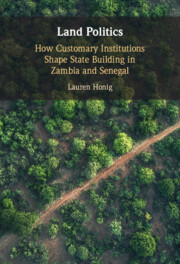Book contents
- Land Politics
- Land Politics
- Copyright page
- Contents
- Figures
- Tables
- Acknowledgments
- 1 Introduction
- 2 Plot by Plot
- 3 Why Institutions Matter
- 4 The Institutional Foundations of Land Authority in Zambia and Senegal
- 5 The Unofficial Differences among Official Chiefs in Zambia
- 6 Holding Ground in Senegal
- 7 Exit or Engagement
- 8 Conclusion
- Book part
- References
- Index
5 - The Unofficial Differences among Official Chiefs in Zambia
Vertical Accountability and Patterns of Land Titling
Published online by Cambridge University Press: 11 August 2022
- Land Politics
- Land Politics
- Copyright page
- Contents
- Figures
- Tables
- Acknowledgments
- 1 Introduction
- 2 Plot by Plot
- 3 Why Institutions Matter
- 4 The Institutional Foundations of Land Authority in Zambia and Senegal
- 5 The Unofficial Differences among Official Chiefs in Zambia
- 6 Holding Ground in Senegal
- 7 Exit or Engagement
- 8 Conclusion
- Book part
- References
- Index
Summary
Chapter 5 examines the influence of customary institutions on land negotiations in Zambia, where chiefs are recognized by the state as custodians of land. The state’s recognition endows individual customary authorities with concentrated power over land titling decisions and gives them incentives to facilitate the state’s projects. However, official chiefs are members of heterogeneous customary institutions; some institutions generate ties of vertical accountability among their chiefs. A comparison of two institutions with hierarchical and nonhierarchical legacies in northern Zambia illustrates this mechanism. Statistical analyses of land titling rates across districts and among smallholder farmers support the argument that strong, hierarchical institutions make it harder to access title in their domains. This chapter shows that the official chieftaincy system did not erase the internal differences among institutions and, as a result, customary institutions continue to impact the expansion of state property rights.
Keywords
- Type
- Chapter
- Information
- Land PoliticsHow Customary Institutions Shape State Building in Zambia and Senegal, pp. 155 - 201Publisher: Cambridge University PressPrint publication year: 2022



